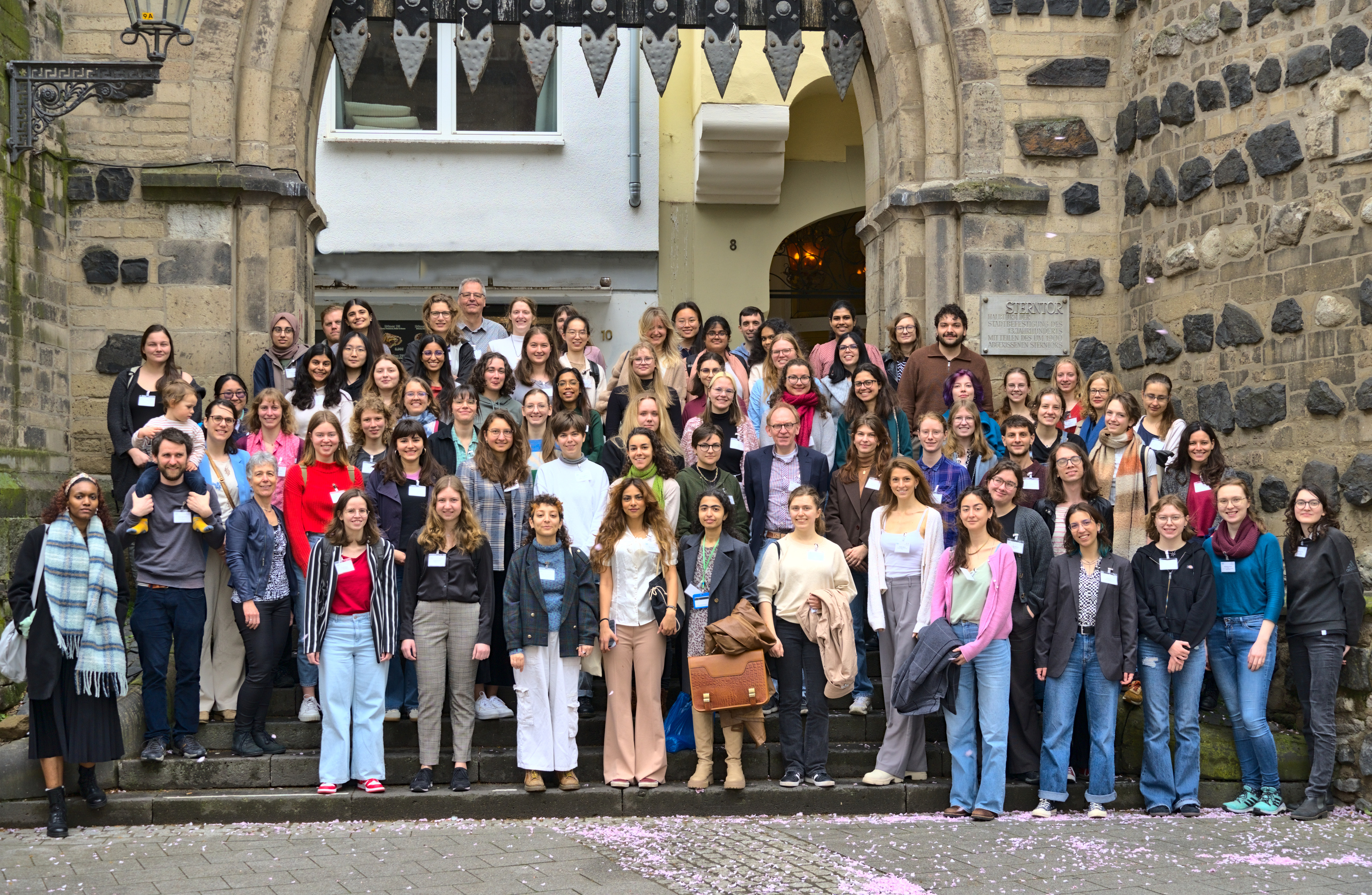Attending the GROW@Bonn conference
I’m writing this post a little late but I want to try out this blog feature :).
The GROW@Bonn conference took place from April 4-5 2024 at the Max Planck Institute in Bonn (MPIM). GROW stands for “Graduate Research Opportunities for Women”. It was the first conference I ever attended (if you don’t count the Young Women in Model Theory conference where I went randomly for one day). So I was really excited for a few reasons: This was my first conference, I would hopefully get to meet a lot of interesting people, and I would get to go into the MPIM building where I had never been before.
On the first day there were a few events that were notable to me. First of all the tour of the MPIM. The building is a lot bigger than I imagined from its small entrance in the city center and it has a really interesting structure since I assume they combined various different historical buildings with stores still underneath. I also got to go past the offices of a few well known mathematicians such as Peter Scholze and it was in general cool to see all the researchers walking around. After that there were PhD student talks where I honestly didn’t understand a whole lot, so I was excited for the coffee break that followed. From what I heard they have these coffee breaks every single day to help the researchers at the MPIM connect with each other. The cake and the tea were very good and I got to talk to a lot of interesting women from different universities in Europe (I remember people from Leiden and Oxford for example) doing a lot of interesting mathematics. The next event on the schedule was a plenary talk by Kathryn Hess Bellwald which made a big impression on me. It was really captivating to hear an accomplished well-spoken mathematician talk about the whole journey of their life instead of only seeing bullet points on a resume. It also fascinated me that she had done work applying algebraic topology - a field that feels very non-applied to me - to “the real world” for example in neurology. In general she was just an amazing speaker. I would listen to her talk about anything, honestly. After the talk we went to the conference dinner at a local restaurant. I got to sit with a few really nice fellow participants of the conference and Viktoriya Ozornova who is a researcher at the MPIM. It is a really amazing and interesting experience being able to speak to a lot more senior people at eye level. She gave me a few pointers about researchers doing maths that might interest me which was super nice of her. She was also the person that inspired me to create this website because she recommended having one in the panel discussion the next day. I really would have liked to stay longer talking to these amazing people but after finishing my dinner my head was killing me and I decided to go home.
Fortunately I felt better the next day. The first event was the already mentioned panel discussion on how to apply to Master’s and PhD programmes. Since a potential PhD is still a long way away and I am planning to apply to Bonn for my Master’s - where entry is quite easy - this wasn’t super relevant to me but interesting nonetheless. They talked about the differences in applying in different countries and at different universities for example. What followed was a research talk. It is a little unfortunate that I remember so little about these talks as I did find them interesting but I guess thats what happens if you’re not super familiar with the material. I’m sorry for not being able to comment on these. After that there was a lunch with mentors which looking back was a highlight of the conference for me. I decided to go with the group mentored by Regula Krapf who among other things has a teaching position at the University of Bonn. I picked her since I already knew her to be really nice and because some of the possible discussion topics she listed were career planning, balancing work and life, and mathematics education - topics I am interested in and/or worried about. I don’t think I have ever been in another conversation where a handful of strangers talked about their experiences and worries so openly. I was honestly surprised by the willingness to talk about their lives of Regula Krapf and Lory Aintablian - a PhD student at the MPIM who also joined our group - as I usually experience a certain distance to people that are so much more advanced in their careers. Hearing some stories of how they managed to fit academia and their mathematical passions into their lives makes you feel like you can do it too. Additionally listening to the struggles and worries of the other participants of the group and comparing them against my own made me feel very comforted and less alone. After lunch Regula Krapf invited us for some coffee which was very nice of her. Next there was one last panel discussion on what to do with a PhD in mathematics. What I really liked about this panel was the input of the people that didn’t end up in academia or at least not in the classical sense. The whole conference up to that point made me feel very eager almost desperate to pursue a research career. So it really helped to get some perspective on the life, work and also research outside of that narrow path. I also remember how nicely the panelists responded to questions from the audience. Overall this was a really nice note to end on.
I really enjoyed this conference. I think it really shines in the safe space it creates for women in different stages of their careers to inspire each other and be vulnerable about their own lived experiences. I remember one male panelist saying something along the lines of “I don’t think I have ever been so outnumbered in terms of gender.” And I think that is also an amazing experience that this conference provided: Not being in the minority for once. I think a lot of us get so used to being outnumbered that we don’t really notice anymore and think that it doesn’t affect us. But being in a room full of female mathematicians was a unique experience that made me feel very empowered, inspired, heard and appreciated. Which is something that I am really grateful to the conference for. The vulnerability and willingness to help others by sharing your own experiences is something that you don’t normally find at the university (or really anywhere) and while I think that women (and other people of minority gender) in maths especially deserve this opportunity I think so many different people in different areas could benefit from this. So thanks to the organizers for creating that space and I hope people are inspired by their amazing work to create these kinds of spaces on small and big scales in different places. I definitely felt this inspiration and will try to attend again next year! To finish this post off nicely here is the conference photo. You can see me to the far right. I am unfortunately not entirely sure who the credit belongs to, sorry.



Leave a comment